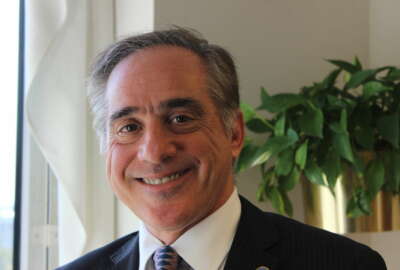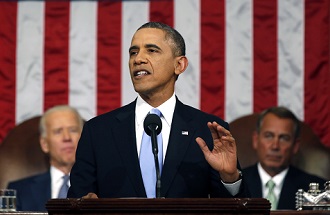Cabinet secretaries fan out to highlight, promote Obama initiatives
President Barack Obama’s final State of the Union speech offered few details on new programs or initiatives for federal managers and contractors. But the...
President Barack Obama’s final State of the Union speech provided little insight or plans for federal employees, managers and contractors for his administration’s final year in office.
But Cabinet secretaries and other leaders are fanning out across the country to promote the White House’s priorities and initiatives.
“The tour is an opportunity for local residents to interact with, and to hear from, members of the President’s Cabinet about the issues that matter most — from climate change to the health and safety of their communities to educational and economic opportunity,” wrote Broderick Johnson, assistant to the President, Cabinet secretary, and chairman of the My Brother’s Keeper Task Force, in a blog post on Jan. 10 ahead of Obama’s speech. “These interactions will continue President Obama’s ongoing conversation with the American people about the challenges that lie ahead and how we can all do our part to advance transformative change for future generations.”
For instance, acting Director of the Office of Personnel Management Beth Cobert will travel to San Antonio on Jan. 14 to participate in a series of events, including a roundtable with veterans and community leaders that will highlight the administration’s efforts to increase the number of veterans in the civilian federal workforce. OPM reported in August that out of the 180,000 employees agencies hired in 2014, 59,000 of them were veterans.
On Jan. 15, VA Secretary Robert McDonald will visit VA’s Jamaica Plain Medical Center and National Center for Post-Traumatic Stress Disorder in Boston to meet with researchers and discuss advancements being made to address the mental health of veterans.
“This tour is another example of how the cabinet has played a critical role in the President’s efforts to define, articulate, and advance policies that address the most pressing challenges we face,” Johnson wrote. “The cabinet’s efforts have helped to cement progress and secure landmark agreements on trade, climate change, and national security. Agencies, often working together, have also led the implementation of policies and initiatives to ensure greater opportunity for all Americans.”
The collaboration among agencies was one of the few specifics Obama talked about Tuesday night.
He announced a new initiative to cure cancer that Vice President Joe Biden is leading.
“Last year, Vice President Biden said that with a new moonshot, America can cure cancer. Last month, he worked with this Congress to give scientists at the National Institutes of Health the strongest resources they’ve had in over a decade,” Obama said. “Tonight, I’m announcing a new national effort to get it done. And because he’s gone to the mat for all of us, on so many issues over the past 40 years, I’m putting Joe in charge of Mission Control. For the loved ones we’ve all lost, for the family we can still save, let’s make America the country that cures cancer once and for all.”
In fiscal 2016, NIH received $32 billion, a $2 billion increase over the previous year and its biggest boost since 2003.
Biden laid out some initial thoughts on what it will take to reach his goal of curing cancer.
“The federal government will do everything it possibly can — through funding, targeted incentives, and increased private-sector coordination — to support research and enable progress,” Biden wrote. “We’ll encourage leading cancer centers to reach unprecedented levels of cooperation, so we can learn more about this terrible disease and how to stop it in its tracks. Data and technology innovators can play a role in revolutionizing how medical and research data is shared and used to reach new breakthroughs. We will help the oncology community improve communication with doctors across the United States and around the world, so the same care provided to patients at the world’s best cancer centers is available to everyone who needs it.”
Biden also said he would later in January lead the first of several meetings with Cabinet secretaries and heads of relevant agencies “to discuss ways to improve federal investment and support of cancer research and treatment.”
Aside from the new initiative to fight cancer, Obama didn’t use the State of the Union to announce any new agency-led initiatives, but did reiterate his commitment to ongoing programs.
“And I’ll keep pushing for progress on the work that still needs doing,” he said. “Fixing a broken immigration system. Protecting our kids from gun violence. Equal pay for equal work, paid leave, raising the minimum wage. All these things still matter to hardworking families; they are still the right thing to do; and I will not let up until they get done.”
The President highlighted the “spirit of innovation” of the country, and the need to ensure Social Security and Medicare and Medicaid are strong and enduring.
Obama also said his administration recognizes there are “outdated regulations that need to be changed, and there’s red tape that needs to be cut.” That has been a common refrain from the Obama administration over the last few years. Starting in 2011, Obama has pushed to improve the permitting process and reviews of major projects including bridges, railways, ports and waterways, roads and renewable energy projects.
In fact, the House Jan. 7 passed a bill to “scrub” unnecessary and burdensome regulations.
Obama didn’t mention past SOTU hot topics such as cybersecurity, intelligence activities or creating a smarter, more efficient government.
The President did call out several well-known federal employees, including Grace Hopper, the Defense Department computer scientist, NASA’s Katherine Johnson, an earlier promoter of science, technology and math education, and Sally Ride, the first woman in space.
Copyright © 2025 Federal News Network. All rights reserved. This website is not intended for users located within the European Economic Area.
Jason Miller is executive editor of Federal News Network and directs news coverage on the people, policy and programs of the federal government.
Follow @jmillerWFED
Related Stories






